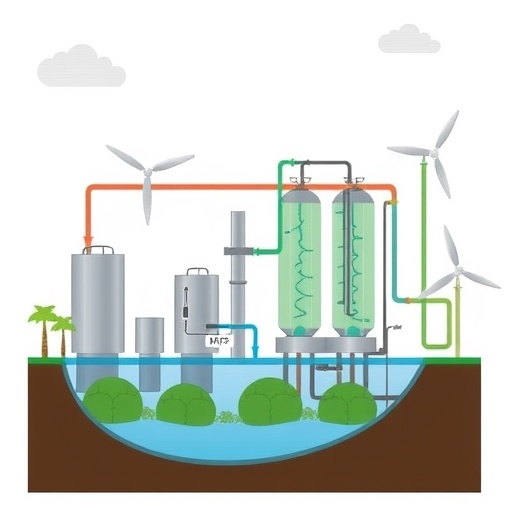In an era of increasing concern over environmental sustainability and renewable energy, researchers have made a groundbreaking advancement in the field of bioenergy generation and wastewater treatment. The innovative study by Walter and Popuri introduced a hybrid system that effectively combines microbial fuel cells (MFCs) with microfiltration technology. This novel approach aims to not only generate energy but also address the significant pollution issues associated with sugar factory effluents. As the global demand for sustainable energy solutions grows, this research sheds light on the potential of utilizing biological processes to tackle pressing environmental challenges.
Microbial fuel cells have emerged as promising devices capable of converting organic waste into electrical energy. By harnessing the metabolic processes of bacteria, these cells facilitate the transfer of electrons from organic substrates, resulting in the generation of electricity. This study takes the concept a step further by integrating microfiltration—a technique that separates particles from liquids—into the MFC process, thereby enhancing both energy production and wastewater treatment efficiency. The collaborative functioning of these technologies stands to revolutionize waste management in the sugar industry, which is notorious for producing high volumes of toxic effluents.
One of the principal motivations for this research stems from the urgent need to reduce the ecological footprint of sugar factories. Traditionally, the disposal of sugar factory effluents poses serious environmental hazards, including the contamination of water bodies with high levels of organic and inorganic pollutants. The synergistic design of the hybrid system addresses this issue by not only treating wastewater but also converting it into usable energy. This dual functionality minimizes waste and transforms an environmental liability into a resource, showcasing the power of innovation in sustainable practices.
The experimental setup described by the authors involved the careful selection of microbial communities known for their high electrogenic potential. By cultivating specific strains of bacteria that thrive in sugar wastewater, the researchers observed enhanced energy output and increased efficiency in the biodegradation of contaminants. This tailored approach highlights the importance of microbial selection in optimizing performance within MFCs and demonstrates how biological systems can be fine-tuned to achieve desired outcomes.
Moreover, the integration of microfiltration expands the parameters of the MFC’s operational capabilities. The microfiltration unit permits the removal of larger particulates and recalcitrant compounds from the effluent before it reaches the MFC. This preliminary treatment step is critical as it minimizes the risk of clogging and fouling within the microbial fuel cell, thereby extending its operational longevity and enhancing overall energy recovery. The authors detailed specific configurations that allow for seamless interactions between the two systems, ensuring that both energy generation and effluent treatment are maximized.
The researchers also conducted extensive analysis to evaluate the overall performance of the hybrid system. Through rigorous experimentation, they measured critical parameters such as voltage output, current density, and pollutant degradation rates. Their findings demonstrated that energy recovery rates were significantly higher when utilizing the hybrid setup compared to conventional treatment methods. This not only underscores the efficacy of the technology but also positions it as a viable alternative for industries seeking to reduce their environmental impact while maintaining operational efficiency.
In addition to its operational benefits, the hybrid system holds promise for broader applications in the field of waste-to-energy technologies. The principles underlying the MFC-microfiltration setup could be extrapolated to other sectors, opening new avenues for innovation in wastewater management across various industries. This adaptability could lead to the development of custom-designed systems tailored to specific industrial processes, further enhancing the sustainability of manufacturing operations and supporting global efforts to combat climate change.
By effectively coupling energy generation with advanced filtration techniques, this study exemplifies the potential for interdisciplinary approaches to solve environmental issues. The integration of biological science with engineering principles fosters a unique environment for creativity and problem-solving in an increasingly resource-constrained world. Researchers and engineers alike can draw inspiration from this work, championing collaborative efforts that transcend traditional academic boundaries to generate holistic solutions for complex global challenges.
As the world grapples with the dual crises of pollution and energy scarcity, the implications of this research extend far beyond the laboratory. Policymakers, industry leaders, and stakeholders must take heed of these advancements and explore opportunities for real-world application. Through supportive regulations, funding initiatives, and public-private partnerships, the transition toward sustainable technologies can be accelerated, ultimately leading to healthier ecosystems and communities. The compelling results of this study provide a crucial stepping stone in the quest for environmentally responsible energy production.
Ultimately, the hybrid microbial fuel cell and microfiltration system posits a transformative approach that addresses multiple facets of waste management and bioenergy production. The ability to generate electricity while simultaneously treating wastewater offers a tantalizing glimpse into the future of sustainable industrial practices. As further research and development proceed, there is great potential for these technologies to be implemented at scale, catalyzing a shift in how industries manage their environmental responsibilities.
In conclusion, the work of Walter and Popuri represents a significant advancement in the integration of bioenergy and wastewater treatment technologies. This innovative study not only challenges the status quo but also provides a practical pathway for industries to reduce their environmental footprint while generating renewable energy. The promise held within these findings is as vast as it is vital, standing as a testament to the power of scientific inquiry and innovation in shaping a more sustainable future.
Subject of Research: Hybrid microbial fuel cell and microfiltration system for bioenergy generation and wastewater treatment.
Article Title: Fabricated microbial fuel cell – microfiltration hybrid system for bioenergy generation and wastewater treatment of sugar factory effluent.
Article References:
Walter, M.J., Popuri, S.R. Fabricated microbial fuel cell – microfiltration hybrid system for bioenergy generation and wastewater treatment of sugar factory effluent.
Environ Sci Pollut Res (2025). https://doi.org/10.1007/s11356-025-37068-x
Image Credits: AI Generated
DOI: 10.1007/s11356-025-37068-x
Keywords: microbial fuel cells, microfiltration, wastewater treatment, renewable energy, sugar factory effluent.




